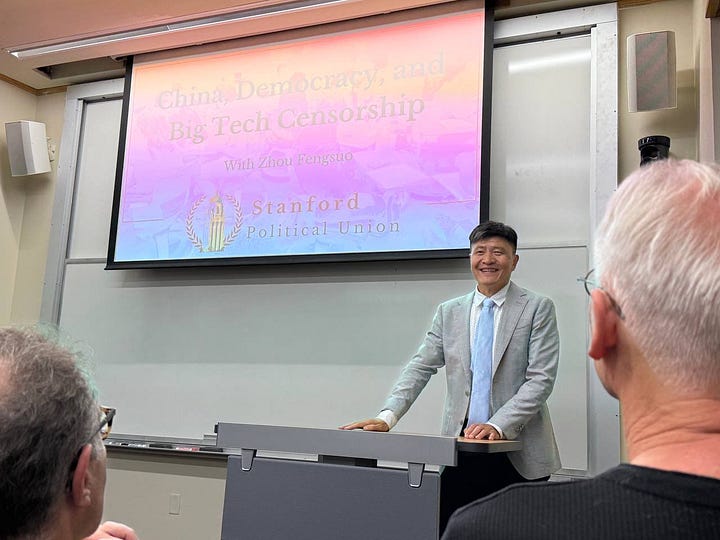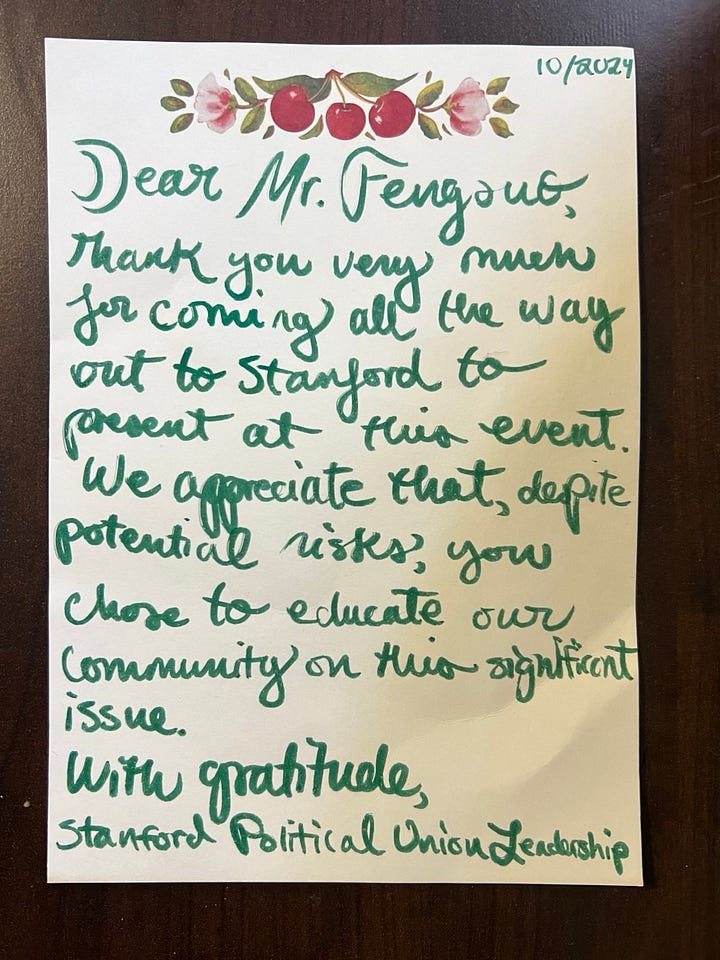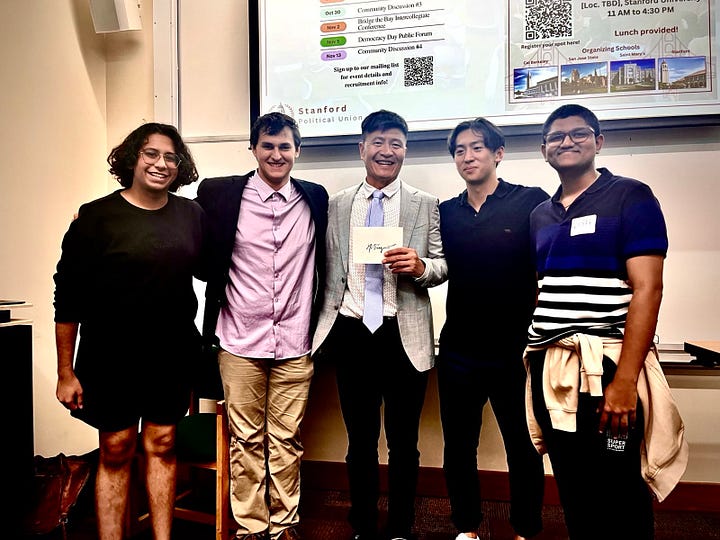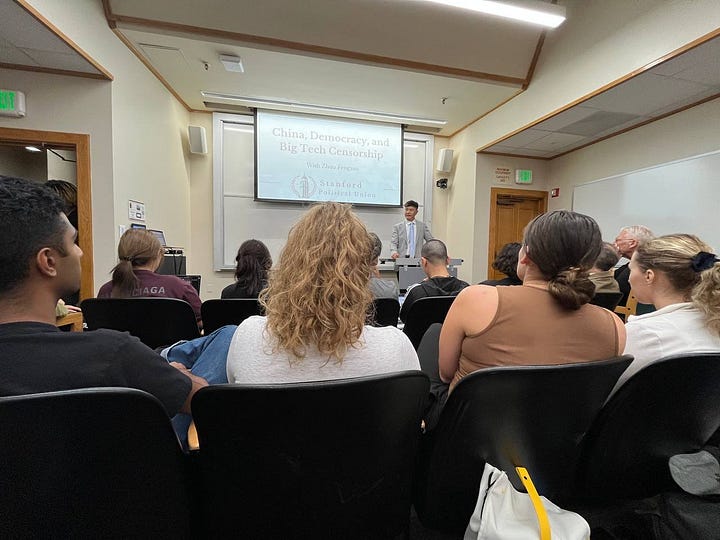On the evening of October 16th, HRIC Executive Director Zhou Fengsuo addressed a packed room of around 70 attendees at the Stanford Political Union. His speech focused on the intersections between technology, democracy, internet freedom, and digital rights in China. Reflecting on his journey from a student leader during the 1989 Tiananmen student protests to his current role, Zhou emphasized the transformative role of technology in shaping advocacy for fundamental human rights and the trajectory of China’s democracy movement.
Zhou described a series of unexpected developments since 1989, noting that the role technology would come to play in China’s democratic movement was unimaginable at the time. As a young protest leader, he could not have anticipated the emergence of an extensive, multi-tiered system of digital surveillance, state-led censorship, and transnational repression. Technology, he argued, has been instrumental for the Chinese Communist Party (CCP) not only in manipulating global narratives but also in systematically tracking and stifling dissent.
Zhou also discussed the shared legacy between the Tiananmen protesters of 1989 and the activists of the 2022 White Paper Movement. He highlighted the phrase “it is my duty,” which was famously spoken by a young protester cycling to Tiananmen Square in 1989 and was adopted by White Paper Movement activists to name their online groups. Despite the CCP’s attempts to eradicate the legacy of Tiananmen protesters, the spirit and record of this phrase cannot be extinguished. The sense of responsibility felt by those advocating for freedom in China lives on.
Zhou highlighted Apple’s 2022 decision to restrict AirDrop features in China as a case study of Big Tech’s potential complicity in suppressing advocacy for human rights. He described how Peng Lifa, known as "Bridge Man," sparked widespread protests by unfurling banners on Beijing’s Sitong Bridge in October 2022, demanding an end to Xi Jinping’s rule and the highly oppressive Zero-COVID policies. Peng’s act of defiance resonated across the country, inspiring the White Paper Movement, where protestors discreetly used AirDrop to disseminate information and Peng’s slogans, bypassing online censorship.
The experiences of a young protester from the White Paper Movement, invited by Zhou to attend the talk, provided a personal connection to these events. He had been arrested in Chengdu in October 2022 for using AirDrop to spread Peng Lifa’s message. He was determined to ensure the truth reached other citizens despite government suppression, and he, along with hundreds of others across China, believed that AirDrop was a secure channel to do so without compromising their safety. Disturbingly, their personal information was then leaked to the police, likely with Apple’s complicity. The exposure of these protestors' personal data raises urgent questions about the ethical responsibilities of tech companies such as Apple in authoritarian contexts, where the stakes for users can be life-threatening.
In November 2022, Apple introduced a software update limiting the "Everyone" option on AirDrop to a 10-minute window specifically for users in China. This change, which coincided with the protests, hindered the ability to share information anonymously. Although Apple cited privacy and security concerns, Zhou raised suspicions of political pressure from Chinese authorities, questioning Big Tech’s role in curtailing human rights. This revelation serves as a stark reminder of the precarious balance between technological empowerment and the ease with which oppressive regimes can co-opt these tools to target dissent.
While acknowledging these risks, Zhou also outlined the crucial benefits technology provides to civil society. Despite the government’s extensive censorship apparatus, he noted that the digital landscape has fostered a vibrant Chinese civil society in cyberspace. Overseas Chinese organizations actively leverage online platforms to share uncensored information, advocate for human rights, and preserve critical historical narratives. Digital platforms, Zhou explained, allow for the preservation of key records, such as those documenting the 1989 Tiananmen massacre, countering the CCP’s efforts to erase these events from public memory.
Within China, citizens rely on VPNs and other circumvention tools to access global networks and bypass censorship. The digital sphere not only preserves history but also provides real-time support and information to those seeking change within China.
Zhou also shared one of his own experiences with Big Tech’s complicity in censorship. In 2020, LinkedIn locked him out of his account after he posted writing commemorating the June 4th massacre victims. He warned that such actions reflect an alarming trend of Western companies aligning with Chinese government demands, risking complicity in suppressing dissent and free expression globally.
During an extended Q&A session, Zhou engaged students with thoughtful responses and encouraged them to contribute to the advancement of human rights in China. He urged them to start with small actions, such as organizing study sessions, hosting talks, or forming student groups to raise awareness. Zhou emphasized the chilling effect of the Chinese government’s transnational repression, noting that fear stifles free expression and action. He urged students to use their voices to shine a light on Chinese activists risking their lives for freedom, and to support organizations such as HRIC.
In closing, Zhou left the audience with a powerful reminder: even small acts can accumulate to create significant change. Every effort to spread awareness, challenge repression, and preserve the truth is a vital contribution to the larger movement for freedom and democracy in China.








